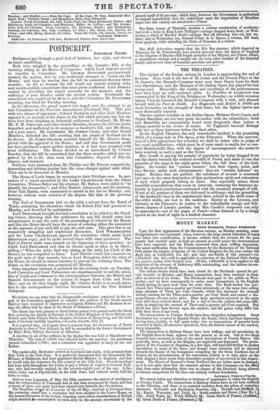THE THEATRES.
The sojourn of the foreign artistes in London is approaching the end of its term. Next week is the last of M. Arnal and the French Plays at the St. James's; the Brussels Company must soon leave Drury Lane for their own Opemhouse; and the Manager of the Italian Opera has played his last tramp-card. Meanwhile, the variety and excellence of the performances have been kept up with unabated spirit. Le Postilion de Lonjumeau was commanded by the King of the Belgians on Wednesday; on which occasion Queen Victoria honoured the Brussels Company with a visit, and pleased herself with La Part du Diable. Les Huguenots and Robert le Diable are stock favourites, on the strength of their fame; but the lighter operas are most thoroughly enjoyed. The two newest vocalists at the Italian Opera, Madame Rossi Caccia and. Signor Baroilhet, are not very great favourites with the subscribers; Grisi and Brambilla are consequently heard more frequently than before: a change grateful to the lovers of mimic. Of Taglioni's farewell fittings only two or three intervene before the final adieu. At the English Theatres, the only remarkable incident is the promising debAt of a young lady in The Sgren, at the Princess's. When the nervous- ness of a first appearance has subsided, we shall be better able to judge of her vocal qualifications; which must be of some mark to enable her tAk suc- ceed Mademoiselle Nan, with the degree of encouragement she seems to have received, in such a part as the Syren. Mrs. Caudle is paying the penalty of popularity by being dragged from out the sheets beneath the comical coverlid of Punch, and made to ran gauntlet of the stage in her night-gown before the full blaze of the foot- lights. No wonder her "curtain lectures" lose their vigour, point, and racy flavour, under such circumstances: they are "curtain lectures" no longer. Besides, they are garbled: the substance of several is crammed into one—to the utter destruction of that pertinacious spirit and reiteration of style which properly belong to them. One especially misses those beautiful contradictions that recur at intervals, betraying the feminine in- firmity in logical conclusions contrasted with the womanly strength of will. Worst of all, portions of them are delivered in soliloquy; and the grumbling of the husband's bass in the matrimonial duet, echoed in the shrill tones of the wife's treble, are lost to the audience. Keeley at the Lyceum, and Oxberry at the Princess's, do justice to the redoubtable energy and full- blown charms of Leech's portrait: but Mrs. Caudle's eloquence can only be appreciated—out of the pages of Punch—when listened to by a sleepy spouse at the dead of night in a hushed chamber.


























 Previous page
Previous page